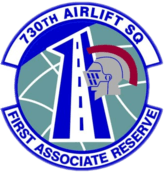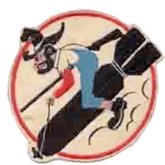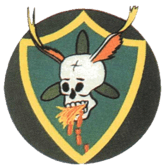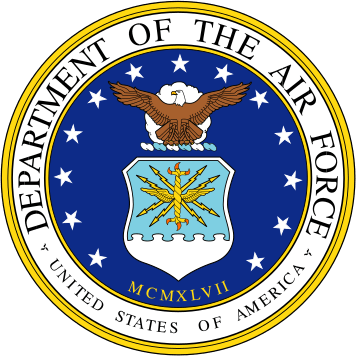730th Airlift Squadron
730th Airlift Squadron
 | |
|---|---|
|
C-141B Starlifter of the 452d Air Mobility Wing over the Grand Canyon | |
| Active | 1943-1945; 1947-1952; 1952-present |
| Country |
|
| Branch |
|
| Role | Airlift |
| Part of | Air Force Reserve Command |
| Garrison/HQ | March Air Reserve Base |
| Engagements | European Theater of Operations |
| Decorations |
Distinguished Unit Citation Air Force Outstanding Unit Award Republic of Korea Presidential Unit Citation Republic of Vietnam Gallantry Cross with Palm |
| Insignia | |
| 730th Airlift Squadron emblem (Approved 11 June 1979)[1] |
 |
| 730 Bombardment Squadron emblem (Korean War) (Approved 14 December 1951)[2] |
 |
| Unofficial 730 Bombardment Squadron emblem (World War II) |
 |
The 730th Airlift Squadron is part of the 452d Air Mobility Wing at March Air Reserve Base, California. It operates McDonnell Douglas C-17 Globemaster III and Boeing KC-135 Stratotanker aircraft providing global airlift.
Mission
Organize, train and equip aircrews to provide strategic airlift any time, any place. The 730th Airlift Squadron at March ARB, CA was inactivated on 1 April 2005. The assigned C-141 aircraft were retired. It re-opened at Altus AFB, OK as a Det 1 assigned under the original Operations Group at March ARB, CA on 01 Oct 2011. It is now a new reserve unit building up at Altus with C-17 and KC-135R aircraft and it will train aircrew alongside of the active duty units already at Altus.
History
Established in mid-1943 as a B-17 Flying Fortress heavy bombardment squadron; assigned to II Bomber Command for training, primarily in the Pacific Northwest. Deployed to the European Theater of Operations (ETO) in January 1944, being assigned to Eighth Air Force in England. Engaged in strategic bombardment operations over Occupied Europe and Nazi Germany, becoming one of the most highly decorated squadron of the Air Offensive. Engaged in strategic bombardment operations until the German Capitulation in May 1945. Returned to the United States and prepared for B-29 transition training, however Japanese Capitulation in August led to unit's inactivation in November.
Reactivated in the reserves in 1947 as a B-29 Superfortress bomber squadron, assigned to Long Beach AAF, California. Never equipped with Superfortresses, redesignated as a light bomb squadron and received B-26 Invaders in 1949. Moved to George AFB in 1950 when Long Beach was closed. Was deployed to Japan in August 1950 for combat duty during the Korean War, engaged in night bombardment missions over both North and South Korea. Inactivated in May 1952 with assets being reassigned to active-duty units.
It has airlifted personnel and cargo worldwide since 1960. Missions the 729th has flown included humanitarian relief, aeromedical flights, and airdrops of supplies and paratroopers. The squadron supported deployment and redeployment of troops to Panama, December 1989-January 1990.
Lineage
- Constituted as the 730th Bombardment Squadron (Heavy) on 14 May 1943
- Activated on 1 June 1943
- Redesignated 730th Bombardment Squadron, Heavy on 20 August 1943
- Inactivated on 28 Aug 1945
- Redesignated 730th Bombardment Squadron, Very Heavy on 3 July 1947
- Activated in the Reserve on 1 August 1947
- Redesignated 730th Bombardment Squadron, Light on 27 June 1949
- Ordered to active service on 10 August 1950
- Redesignated 730th Bombardment Squadron, Light, Night Intruder on 25 June 1951
- Relieved from active service and inactivated on 10 May 1952
- Redesignated 730th Tactical Reconnaissance Squadron, Night Photo on 6 June 1952
- Activated in the Reserve on 13 June 1952
- Redesignated: 730th Bombardment Squadron, Tactical on 22 May 1955
- Redesignated: 730th Troop Carrier Squadron, Medium on 1 July 1957
- Redesignated: 730th Tactical Airlift Squadron on 1 Jul 1967
- Redesignated: 730th Military Airlift Squadron (Associate) on 25 March 1968
- Redesignated: 730th Airlift Squadron (Associate) on 1 February 1992
- Redesignated: 730th Airlift Squadron on 1 April 1993[1]
Assignments
- 452d Bombardment Group, 1 June 1943 - 28 August 1945
- 452d Bombardment Group, 1 August 1947 - 10 May 1952
- 452d Tactical Reconnaissance Group (later 452d Bombardment Group, 452d Troop Carrier Group), 13 June 1952
- 452d Troop Carrier Wing, 14 April 1959
- 944th Troop Carrier Group (later 944th Tactical Airlift Group, 944th Military Airlift Group), 17 January 1963
- 445th Military Airlift Wing, 1 July 1973
- 445th Operations Group, 1 August 1992
- 452d Operations Group, 1 May 1994 – present[1]
Stations
|
|
Aircraft
|
|
Operations
References
- Notes
Bibliography
![]() This article incorporates public domain material from the Air Force Historical Research Agency website http://www.afhra.af.mil/.
This article incorporates public domain material from the Air Force Historical Research Agency website http://www.afhra.af.mil/.
- Maurer, Maurer, ed. (1983) [1961]. Air Force Combat Units of World War II (PDF) (reprint ed.). Washington, DC: Office of Air Force History. ISBN 0-912799-02-1. LCCN 61060979.
- Maurer, Maurer, ed. (1982) [1969]. Combat Squadrons of the Air Force, World War II (PDF) (reprint ed.). Washington, DC: Office of Air Force History. ISBN 0-405-12194-6. LCCN 70605402. OCLC 72556.
- Ravenstein, Charles A. (1984). Air Force Combat Wings, Lineage & Honors Histories 1947-1977 (PDF). Washington, DC: Office of Air Force History. ISBN 0-912799-12-9.

